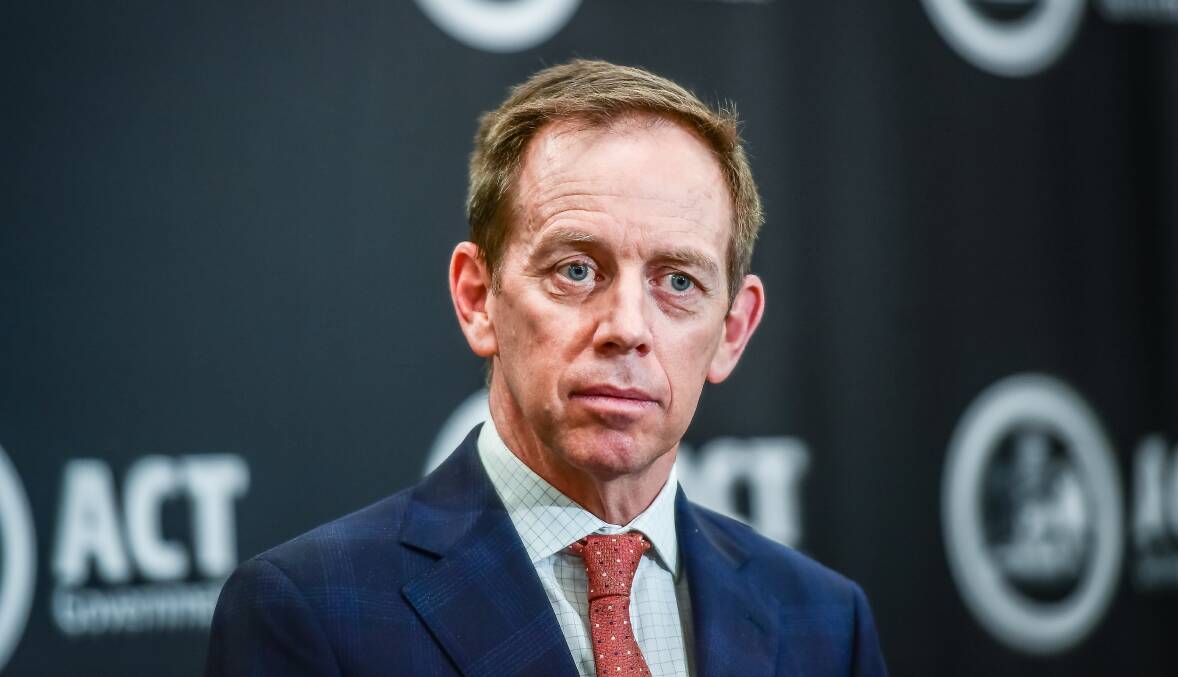
Parts of the ACT's justice system cracked under the pressure of intense media scrutiny on the Parliament House rape case but it will be strengthened following a board of inquiry, the Attorney-General has said.
Shane Rattenbury said the system remained robust overall and 10 recommendations from a board of inquiry would strengthen the "stress points" after the report came as a "wake-up call for justice agencies".
Mr Rattenbury said he believed work on 10 recommendations made by Walter Sofronoff KC would be completed before the next territory election in October 2024.
"I think the matters that have now arisen around the way it was disclosed are unfortunate," Mr Rattenbury told The Canberra Times on Tuesday.
"I just find it incredulous that it happened that way, but that doesn't undermine the substantive work that was done to draw out, particularly, the 10 recommendations, which are really practical and do give us a pathway forward."
Mr Rattenbury acknowledged the way the report's findings had been portrayed in public made it seem the "sensational" inquiry was about the actions of the now resigned Director of Public Prosecutions, Shane Drumgold SC.
But there were "concrete recommendations [and] important follow-up work" that would improve the justice system overall, he said.
"Once we get past the sensational aspects of it, and the strong words that have been used, particularly to describe Mr Drumgold - in the sober light of day, I think a lot of people will take a lot from this report that will ultimately make the system better," Mr Rattenbury.
The board of inquiry examined the handling of Bruce Lehrmann's rape trial, which was abandoned after juror misconduct in October 2022. Former federal political staffer Brittany Higgins had accused Mr Lehrmann, who has maintained his innocence.
Mr Rattenbury said many elements of the justice system worked well, but the recommendations would put in place safeguards and clarify practice.
"There was some uncertainty, there was some confusion about exact thresholds, you know, where the law has described things in a certain way, people through practice had interpreted them in somewhat different ways," he said.
"What [Mr Sofronoff] gives us here is a guide to making sure that we remove those gray zones and put more crispness around some of the procedural steps that police and the [Director of Public Prosecutions] particularly have to go through."
Mr Rattenbury agreed the media attention - including leaks of information in the aftermath of the trial - had highlighted issues with the justice system that did not normally cause problems as police and prosecutors did their jobs without significant public attention.
"Normally police would quietly go about their business. They'd work with the DPP, they'd sort it all out, and then they'd move forward in a normal way, and clearly this wasn't like that," he said.
"I think the external pressure did open up stress points in normal processes."
Mr Rattenbury said he would continue to work to improve the justice system so that it had "a victim-friendly process that also ensures procedural fairness for the accused".
"It's such a tricky space and one that I think all jurisdictions are grappling with at the moment," he said.
The recommendations include a policy for ACT Policing to define the threshold at which a person can be charged for a crime, changes to the Victims of Crime Act 1994, along with changes to governance material covering how counselling notes must be stored with ACT Policing and the process to check briefs of evidence before they are provided to defence lawyers.
The government agreed in principle to a recommendation that ACT Policing devise a protocol that affirmed "the desirability of police witnesses being available to legal representative for a defendant".
The government noted the protocol might have operational implications for police, which meant it required further consideration.
The government also agreed in principle to a recommendation the ACT pass laws to "codify the scope and content of the obligation of disclosure owed by the prosecution in criminal proceedings", saying it would work with stakeholders to examine the issues.
Mr Rattenbury on Tuesday said he expected to keep the Legislative Assembly updated on progress to implement the recommendations, but he said the rollout should proceed "reasonably smoothly".
"Certainly both ACT Policing and the [Office of the Director of Public Prosecutions] have a degree of independence from government, but they are also elements of the state," he said.
"And so we expect them to work with us to deliver these outcomes."
Mr Rattenbury said possible changes to section 17 of the Inquiries Act 1991, which sets out penalties for the disclosure of information of information acquired for a board of inquiry, were less urgent that implementing the recommendations of the report.
"It's not the most pressing thing, but it's now an issue that we need to look at," he said.
Mr Sofronoff told the ACT government he had provided advance copies without authorisation to two journalists and Ms Higgins' solicitor, and had also briefed journalists during the public hearings, Chief Minister Andrew Barr said on Monday.
Mr Barr on Monday indicated Mr Sofronoff could be referred to the ACT's Integrity Commission and said the government was considering its options.
The Inquiries Act includes a six-month prison term or an $8000 fine for unlawful disclosure of information from a board of inquiry. The Canberra Times does not suggest Mr Sofronoff has broken the law.
We've made it a whole lot easier for you to have your say. Our new comment platform requires only one log-in to access articles and to join the discussion on The Canberra Times website. Find out how to register so you can enjoy civil, friendly and engaging discussions. See our moderation policy here.







